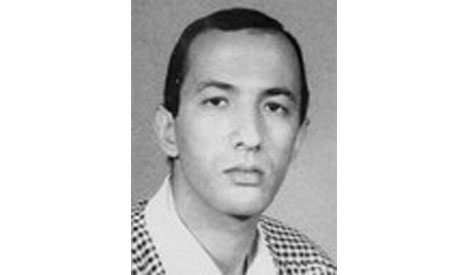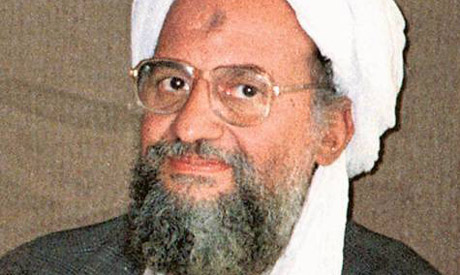
This image provided by the FBI shows an undated image of Saif al-Adel also known as Muhamad Ibrahim Makkawi, Seif Al Adel, Ibrahim Al-Madani. He was arrested Wednesday Feb. 29, 2012 at Cairo Airport (Photo: AP)
Egyptian national Mohamed Ibrahim Makkawi was arrested at Cairo International Airport on Wednesday afternoon upon his arrival from the UAE on suspicions that he was in fact Seif Al-Adel, a former leader of international terror outfit "Al-Qaeda."
Al-Adel, a former Egyptian Special Forces officer now in his 50s, allegedly succeeded the late Osama bin Laden as Al-Qaeda chief on a temporary basis before Egyptian physician Ayman El-Zawahri reportedly assumed the post.
Makkawi, for his part, who says he has previously been mistaken for Al-Adel, has stressed his readiness to be questioned by Egyptian authorities. He does not deny, however, that he had once been a member of Al-Qaeda.
An airport source told Ahram Online that authorities had been informed in advance of Makkawi's planned visit to Egypt.
He was apprehended by security forces shortly after his arrival to the country.
Before coming to Egypt, the cash-strapped Makkawi says he visited Egypt's embassy in the UAE, where he reportedly requested a ticket to Cairo, which, he says, he was unable to afford.
According to the airport source, Makkawi first arrived in the UAE from Pakistan. He entered the Gulf country on a temporary passport, which had been issued in Islamabad on 28 February.
"He told Egyptian embassy officials in the UAE that he had defected from Al-Qaeda a long time ago, strenuously denying claims that he was bin Laden’s successor," said the airport source, who spoke on condition of anonymity.
"Makkawi said he wanted to return to Egypt after last year's revolution, saying he had originally left the country due to Mubarak-era injustice," the source added. "He says he welcomes interrogations and investigations so as to clear his name and prove he isn't Al-Adel."
“He explained his link to the terrorist organisation by saying he was married to the daughter of an Al-Qaeda warlord," the source concluded.
Meanwhile, French news agency AFP reported that Egyptian security officials had stated definitively that Makkawi was not, in fact, an Al-Qaeda operative.
"He is wanted for involvement with the Al-Jihad group. He is not Seif Al-Adel," a source at the National Security apparatus was quoted as saying.
The same source went on to explain that Makkawi had left for Afghanistan to join the war against the Soviet Union in the 1980s, later settling down in neighbouring Pakistan.
In an interview in May of last year with pan-Arab daily Asharq Al-Awsat, Makkawi said he had been mistakenly identified as the senior militant. He went on to tell the newspaper that he had disagreed with Al-Qaeda's leadership and therefore sought political asylum in Pakistan.
"Following the tragic events of 9/11, I was surprised to find my name and history under the image of another Egyptian, under the false name of 'Seif Al-Adel,' as part of the FBI's list of the 22 most wanted terrorists – even though I have no connection to Al-Qaeda or its operations," Makkawi said at the time.
In the interview, he added that he was wanted in Egypt for involvement with the Al-Jihad group, a onetime militant outfit that eventually renounced violence in the late 1990s.
After the killing of bin Laden in a US commando raid in Pakistan in May of last year, reports emerged that Seif Al-Adel – later identified as Makkawi – had become the jihadist network's acting chief.
Analysts now say, however, that Makkawi had been mistaken for another militant of a similar background.
The United States, meanwhile, accuses Al-Adel of setting up Al-Qaeda training camps in Sudan and Afghanistan in the 1980s. Washington also claims that he was involved in the 1998 bombings of US embassies in Kenya and Tanzania.

